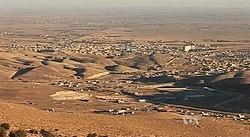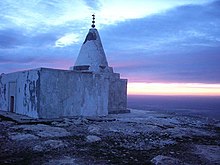Sinjar: Difference between revisions
→Autonomy: added picture Tags: Mobile edit Mobile web edit |
no sources needed for this Tags: Mobile edit Mobile web edit |
||
| Line 39: | Line 39: | ||
| website = |
| website = |
||
}} |
}} |
||
'''Sinjar''', also known as '''Shingal'''<ref>{{cite book |last=King|first=Diane E. |date=2013 |title=Kurdistan on the Global Stage: Kinship, Land, and Community in Iraq |url=https://books.google.com/books?id=HNcyAgAAQBAJ |location= |publisher=Rutgers University Press|page=181|isbn=9780813563541}}</ref> ({{lang-ar|سنجار}}, [[Kurmanji]]: Şingal or Şengal, |
'''Sinjar''', also known as '''Shingal'''<ref>{{cite book |last=King|first=Diane E. |date=2013 |title=Kurdistan on the Global Stage: Kinship, Land, and Community in Iraq |url=https://books.google.com/books?id=HNcyAgAAQBAJ |location= |publisher=Rutgers University Press|page=181|isbn=9780813563541}}</ref> ({{lang-ar|سنجار}}, [[Kurmanji]]: Şingal or Şengal, [[Ancient Greek]]: ''[[Singara]]''), is a town in [[Sinjar District|Shingal District]], [[Nineveh Governorate]], [[Iraq]] near [[Mount Sinjar|Mount Shingal]]. Its population in 2013 was estimated at 88,023.<ref>{{Cite web |url=http://www.world-gazetteer.com/wg.php?x=1&men=gcis&lng=en&des=gamelan&geo=-3&col=abcdefghinoq&msz=1500&geo=-105 |title=Iraq: largest cities and towns and statistics of their population |publisher=World Gazetteer <!-- Blacklisted but valid: |archiveurl=http://archive[dot]today/xrUEM#selection-115.0-115.15 |archivedate=27 June 2013 |accessdate=20 June 2014 -->}}{{Dead link|date=June 2014}}</ref> The town is inhabited by [[Yazidis]] and is one of the main settlement areas of the Yazidis. |
||
[[File:YezidiTemple.JPG|thumb|The important ''Chermera'' temple (meaning '40 Men') is found on the highest peak of the [[Sinjar Mountains]].]] |
[[File:YezidiTemple.JPG|thumb|The important ''Chermera'' temple (meaning '40 Men') is found on the highest peak of the [[Sinjar Mountains]].]] |
||
Revision as of 07:10, 9 August 2019
Sinjar
Shingal سنجار | |
|---|---|
 | |
| Coordinates: 36°19′21″N 41°51′51″E / 36.32250°N 41.86417°E | |
| Country | |
| Governorate | Nineveh |
| District | Sinjar District |
| Government | |
| • Mayor | Fahad Hamid Omar[1] |
| Elevation | 522 m (1,713 ft) |
| Population (2013) | |
| • Total | 88,023 |
| Time zone | UTC+3 (GMT) |
Sinjar, also known as Shingal[2] (Arabic: سنجار, Kurmanji: Şingal or Şengal, Ancient Greek: Singara), is a town in Shingal District, Nineveh Governorate, Iraq near Mount Shingal. Its population in 2013 was estimated at 88,023.[3] The town is inhabited by Yazidis and is one of the main settlement areas of the Yazidis.

History

In the 2nd century A.D., Sinjar became a military base and part of the Roman limes, and it remained part of the Roman Empire until it was sacked by the Sassanids in 360 A.D. At the beginning of 6th century A.D., it was inhabited by a tribe called Qadišaiē (Kαδίσηυοι). It was conquered by the Muslim Arabs led by Iyad ibn Ghanm.[4]
In 2014, several explosions set off by al-Qaeda in Iraq killed hundreds of Yazidis in Shingal.[5]
Northern Iraq Offensive (2014)

In the course of their second Northern Iraq offensive in August 2014, ISIL conquered large areas of Nineveh province. Following the fightless escape of the Kurdish Peshmerga they seized the city of Shingal on 3 August. During the following days, IS militants perpetrated the Sinjar massacre, killing 2,000 Yazidi men and taking Yazidi women into slavery, leading to a mass exodus of Yazidi residents. According to a UN report, 5,000 Yazidi civilians were killed during ISIL's August offensive. It is also known as the genocide of Yazidis by ISIL. The genocide could only happen because the Kurdish Peshmerga had fled from the ISIS and left the Yazidis defenseless.[6][7][8]
On the night of 20 December 2014, in the course of a first offensive to retake it from Islamic State militants, Kurdish forces pushed into the city of Sinjar.[9] However, the Kurdish advance into the city was stalled, as they faced fierce resistance from the ISIL militants inside the southern half of the city.[10]
On 13 November 2015, a day after launching a major second offensive, Kurdish forces and Yazidi militias backed by US airstrikes, entered the city and fully regained its control from ISIL.[11] Following the recapture, in nearby hamlet of Solagh, east of Sinjar city, Kurdish forces found a mass grave with the remains of at least 78 Yazidi women from Kocho village believed to be executed by ISIL militants.[12][13]
Following the liberation of Sinjar, Yazidi groups engaged in revenge looting and burning targeting Sunni Muslims, as well as reprisal killings.[14][15]
Autonomy

In August 2017, the Yazidis of Sinjar declared their government autonomous at a press conference.[16] Peshmerga forces withdrew from Sinjar on October 17, 2017, allowing the Iraqi Army and the Popular Mobilisation Units (PMU) to enter the town. The control of the town was handed over to the PMU-backed Yazidi group called "Lalesh Brigades" after Peshmerga's withdrawal.[17][18][19][20]
See also
- Yazidi genocide
- Military intervention against ISIL
- American-led intervention in Iraq (2014–present)
- Kurdification
- Arabization
References
- ^ http://www.basnews.com/index.php/en/news/kurdistan/283611
- ^ King, Diane E. (2013). Kurdistan on the Global Stage: Kinship, Land, and Community in Iraq. Rutgers University Press. p. 181. ISBN 9780813563541.
- ^ "Iraq: largest cities and towns and statistics of their population". World Gazetteer.[dead link]
- ^ Alexander, Paul J. (1985). The Byzantine Apocalyptic Tradition. University of California Press. p. 27. ISBN 0520049985.
- ^ Shefler, Gil (7 August 2014). "Islamic State accused of capturing Yazidi women and forcing them to convert, or else". Washington Post. Religion News Service. Retrieved 7 October 2014.
- ^ Phillips, David L. (29 November 2018). The Great Betrayal: How America Abandoned the Kurds and Lost the Middle East. Bloomsbury Publishing. ISBN 9781786735768.
- ^ Murad, Nadia (7 November 2017). The Last Girl: My Story of Captivity, and My Fight Against the Islamic State. Crown/Archetype. ISBN 9781524760458.
- ^ "Isil carried out massacres and mass sexual enslavement of Yazidis, UN confirms". Daily Telegraph. 14 October 2014. Retrieved 27 October 2015.
- ^ "Iraq's Kurds press offensive against Islamic State in Sinjar". DPA International. Archived from the original on 4 January 2015. Retrieved 21 December 2014.
{{cite web}}: Unknown parameter|deadurl=ignored (|url-status=suggested) (help) - ^ "Iraqi Kurds Advance Against Islamic State in Sinjar". Wall Street Journal. Retrieved 21 December 2014.
- ^ "Battle for Sinjar: IS-held town in Iraq 'liberated'". BBC News. 13 November 2015.
- ^ Isabel Coles (14 November 2015). "Mass Yazidi grave discovered after Iraq's Sinjar taken from Islamic State". Reuters. Retrieved 14 November 2015.
- ^ "Mass grave of 'Yazidi women executed by ISIS' found in Iraq". AFP. 14 November 2015. Retrieved 14 November 2015.
- ^ "Yazidis burn Muslim homes in Iraq's Sinjar: witnesses". Yahoo News. 15 November 2015.
- ^ "Yazidis Get Revenge On ISIS In Sinjar". The Daily Beast. 3 December 2015.
- ^ Emo, Salim; Seyid, Mehabad (August 22, 2017). "Êzidî women: Autonomy will bring freedom". ANF News. Retrieved August 22, 2017.
- ^ Szlanko, Balint (17 October 2017). "Iraq: After losing Kirkuk, Kurdish forces pull out of Sinjar". CTVNews.
- ^ Martin Chulov. "Iraqi forces drive Kurdish fighters out of town of Sinjar". Retrieved 18 November 2017.
- ^ Iraqi-backed Yazidi group takes over Sinjar after Kurdish pullout Middle East Eye
- ^ Yazidis caught in 'political football' between Baghdad, Iraqi Kurds Reuters
Further reading
- Mironova, Vera; Hussein, Mohammed (June 5, 2017). "The Struggle Over Sinjar". Foreign Affairs. ISSN 0015-7120.

